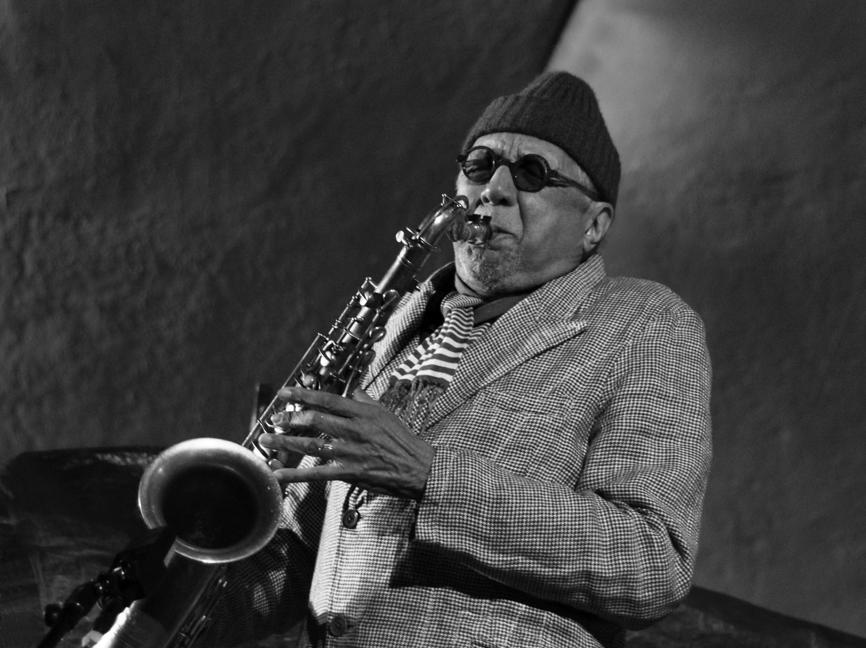
Charles Lloyd
& the Marvels
Presented by World Music/
CRASHarts. At Berklee Performance Center, Sunday at 7:30 p.m. Tickets $30-$48. 617-876-4275, www.worldmusic.org
Charles Lloyd was on his way to becoming a jazz giant long before any jazz fans knew his name. Getting his first alto saxophone at 9, the Memphis native won an amateur contest at 10, and soon began taking lessons. A move to Los Angeles at 18 had him studying classical music by day, and sitting in with Ornette Coleman, Eric Dolphy, Charlie Haden, and others at night. A right-time, right-place situation led to a steady gig as player, composer, and music director in drummer Chico Hamilton’s band, and a switch from alto to tenor sax.
After leaving Hamilton, Lloyd did a stint in the Cannonball Adderley Sextet, then formed his own quartet with pianist Keith Jarrett, bassist Cecil McBee, and drummer Jack DeJohnette. That band’s 1966 album, “Forest Flower,’’ was one of the first jazz records to sell a million copies. Lloyd’s fearless improvisations, ranging from a soft whisper to a cacophonous roar, earned him rock-star status and gigs opening for Jimi Hendrix, Janis Joplin, and the Grateful Dead.
But Lloyd walked away from music in 1970, settling in Big Sur to follow a spiritual path. He returned to the scene a decade later, and since the mid-1980s has been regularly touring and recording. His new Blue Note album, “I Long to See You,’’ features him on tenor and flute with his current band, the Marvels (Eric Harland, drums; Reuben Rogers, bass; Bill Frisell, guitar; Greg Leisz, pedal steel). They perform at Berklee Performance Center on Jan. 31. Lloyd, 77, spoke by phone from his home near Santa Barbara.
Q. How did the saxophone come into your life?
A. To tell you the truth, I wanted to be a singer, but I knew by 7 that I didn’t have the voice to be the singer I wanted to be. Then I got bitten by the bug when I would go hear Duke’s band and Count Basie’s band when they came to Memphis. I knew saxophone was the instrument for me, and I begged my folks for one. When I was 9, they got me an alto, and I played it nonstop.
Q. You worked with some of the top musicians, but really hit it big when you formed your own quartet. How did you put that group together?
A. I was living in the Village. I had heard Jack DeJohnette play, and he wanted to play with me, so we started. Cecil McBee was around New York, and I knew he could play, so I invited him. Before that, I was playing with Cannonball at the Jazz Workshop in Boston, and I heard this kid playing piano at the bar upstairs. I would run up to hear him, and when he was on a break, he would run downstairs to hear me. That was Keith Jarrett, and after I left Cannonball, I called him. People went crazy when they heard that formation. It was magical.
Q. Why did you get out when you were at the top of your game?
A. I was on a purification mission and a spiritual quest. I was playing music out in nature, but not in a public way.
Q. Were you welcomed with open arms when you came back?
A. No. I wanted to play major venues, but the music promoters said, ‘You’ve been gone a long time, you have to get to the back of the line.’ But that was understood. This wasn’t major cash-flow Beatles rock ’n’ roll music. You’re talking about an esthetic that’s beautiful, but it’s traditionally not been treated with the same respect or had the same kind of exposure.
Q. “I Long to See You,’’ has two guitarists instead of your regular pianist, Jason Moran. What happened there?
A. Jason and I still play together; the two of us are going out on a European tour in the spring. But I had known Bill Frisell over the years, and we always had this simpatico. We played a few concerts together and he mentioned the pedal-steel player, Greg Leisz. Later, when I heard them play, they were like two sides of a coin. After that, Bill was scheduled to play with me, along with my regular guys, Eric and Reuben, so I asked Bill if Greg could sit in. He played on several pieces, and I liked the confluence of that group, so we booked some dates together.
Q. You’ve said before that you haven’t gotten to where you want to be on the tenor yet. How’s that working out?
A. That’s still going on. I hear a sound in my head that would make the universe a harmonious, loving place. If I could get that out, maybe everyone, without reservation, could hear it. The problem with words is that they mean different things to different people. But the thing about music is that it goes directly to the heart. What I’m offering has universality, and it can touch people in a very deep and special way, which music always did for me. So to answer your question: I’m still here, so I’m still looking for that.
Ed Symkus can be reached at esymkus@rcn.com.



